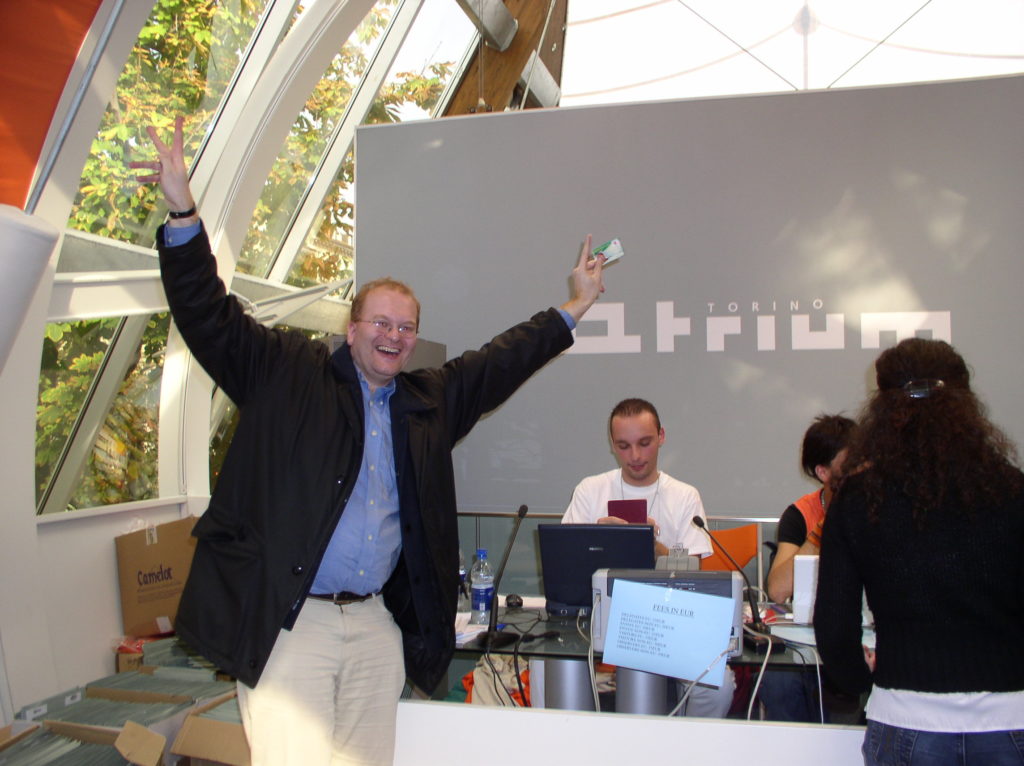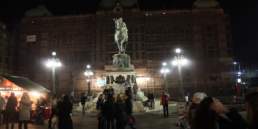Have you ever wondered why more than half of the selected Agora participants are visitors and not delegates? This is quite untypical for the parliament of a big association, but essential for the functioning of AEGEE. The way how these visitors are selected is an ongoing topic in AEGEE. Find out more about it in this article.
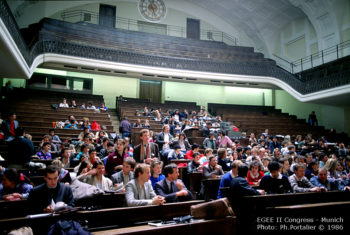
AEGEE’s first Agora was small. Around 50 people from 18 antennae took part – and it lasted just a few hours. It was actually not an own event – it took place during the thematic conference EGEE II, which lasted from 19th to 25th of April 1986, exactly one year after AEGEE’s founding conference EGEE I. On Tuesday afternoon, on 22nd of April 1986, 50 of the participants gathered for the Agora, right after lunch and before a panel discussion about the “German question”.
For the next couple of years, the spring Agora was always connected to a big thematic conference. This made the Agora open not only for the three delegates per antennae, but also for the conference participants, who wanted to see what was going on. In short: the visitors were part of the Agora right from the start. But: they were not called visitors. Until 1999 their name was observer – a title that today only representatives of AEGEE contacts have.

Flexible number of visitors
For many years AEGEE did not regulate who could become a visitor, how many could attend and who selected them. Even today the number of visitors is flexible – it is basically defined by the ability of the local organizer to accommodate participants. If you count the three delegates per antenna, the CD, Chair, commissions, observers from contacts, representatives of working groups and other essential personal, you get a number of 500 people for whom space needs to be provided. Everyone that can be hosted on top can come as visitor. Sometimes the total number is defined by the seating capacity of the plenary hall, sometimes by the size of the gym or, as in case of Agora Budapest in 2012, by the number of people that may fit into the party place. The biggest Agora ever was Agora Maastricht in 1998 with 1150 people.
An example: For the Agora in Kraków in April 2018 altogether 846 members were selected as participant:
- 260 are delegates by the antennae,
- 88 are envoys: CD, Chair, commissions, committees, working groups, projects and representatives of contact antennae,
- 5 are observers: these are members of AEGEE contacts
- 493, that’s 58.3% of all people, are visitors: members of locals, commissions, alumni, former CD members, project team members, working group members and 462 are attending as members of their antennae.
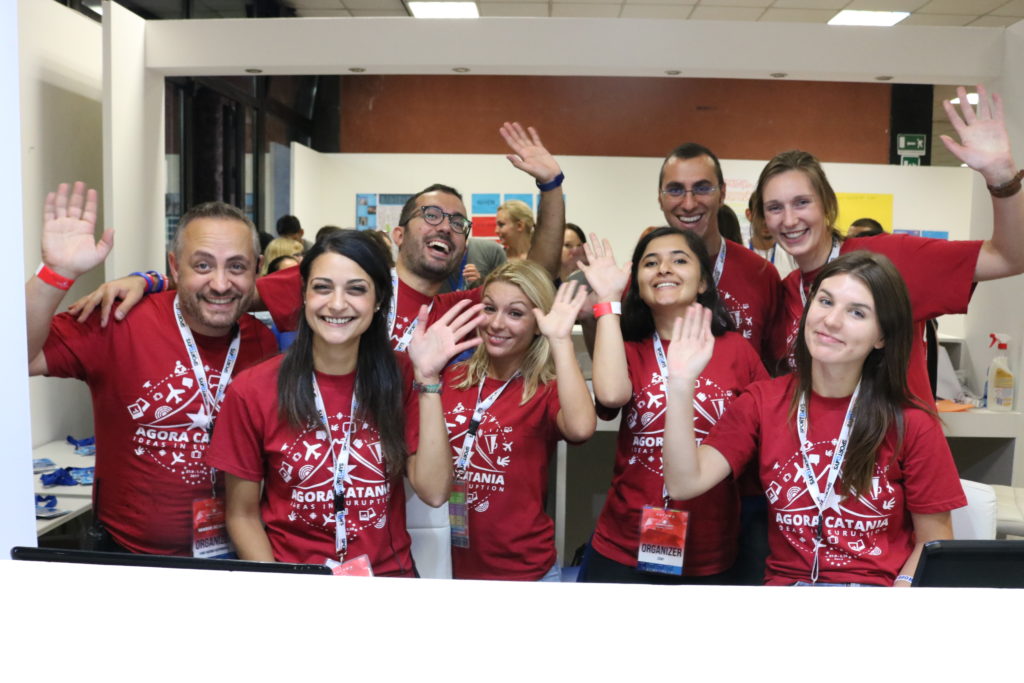
Limited rights, but great function
The visitors – or observers, as they were called until 1999 – have no official role. They have no voting rights; they also have no speaking rights and need to ask the Chair for permission if they want to address the plenary on stage. However, in the numerous workshops they can talk just like the delegates. Moreover, since many of them are members of project teams and working groups or interest groups, they play a great role in the thematic work of AEGEE during the Agora – they often organize these workshops. They visitors of the antennae are often functioning as advisors to the delegates. Since the visitors are important, no one proposed to remove the visitors from the Agora. This would harm AEGEE a lot.
Nevertheless, although they existed for many years, until 1995 the statutes of AEGEE did not mention visitors at all. The first Corpus Iuridicum (CIA) that mentioned visitor was CIA 7 in 1996! The Agora in Athina in November 1996 added these paragraphs to the statutes, in article 2 of the Agora Working Format:
(4) 1 Any member of an AEGEE local has the right to act as an observer to the Agora. 2 Other observers may only attend with the permission of the Agora Chairman. 3 Observers have no speaking nor voting right.
(5) The number of observers per local depends on the capacity of the organizing AEGEE local.
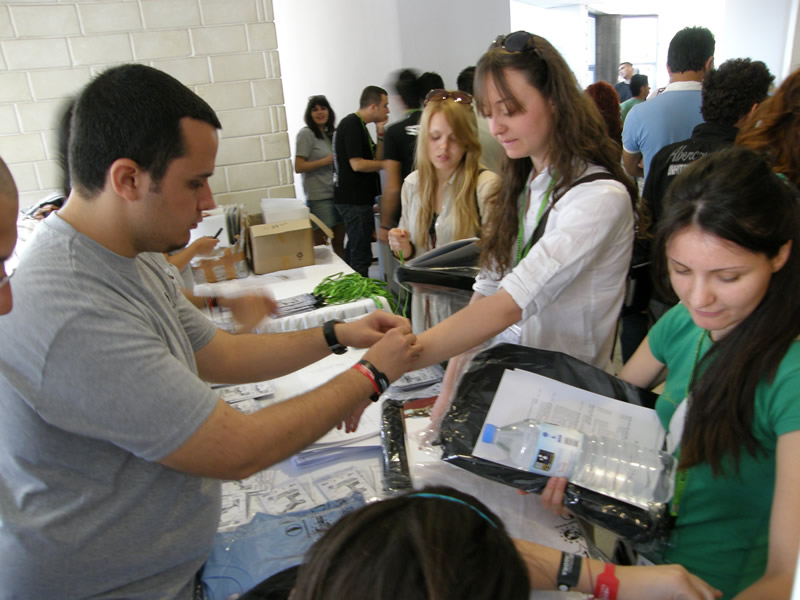
Selected by the local antenna
But who chose the observers? As a matter of fact, the selection of these visitors was in the hand of the local antenna – for practical reasons. The Internet was becoming a wide-spread communication tool only in the mid-90s. Some members had their first e-mail account around 2000. A lot of communication was done via mail and fax – including the Agora applications. Since the local antenna had to know for logistical reasons who wanted to attend the event, the Chair left it to the local host to select the observers. How did they chose them? That was up to the local antenna. There were no motivation letters, so usually every antenna got a couple of visitors, bigger ones a few more places. In often paid off to be friends with the organizers.

Two examples: The application form for Agora Amsterdam in 1991 consisted of four lines in the bottom of the programme flyer: “name, AEGEE antenna, delegate yes/no, lodging yes/no”. The flyer was more about the explanation of Queensday, which took place during the Agora, than about the application procedure. This little application form had to be sent to the local organizer in a traditional envelope! Five years later, for spring Agora Valladolid in 1996, every antenna had to send a fax with the list of delegates and visitors to the hosting local. And they wrote back who could come.
The local organizers were very flexible. I remember my first Agora in Amsterdam in April 1995. I was member for just two months and did not know what an Agora is when the president of my antenna, AEGEE-Szeged, approached me and said: “One of our 14 Agora participants cannot go. You want to take part instead?” I said of course yes. At the registration desk of AEGEE-Amsterdam I turned to a friendly local girl who said: “I don’t find your name on the list”. I replied: “Oh, I am here instead of this guy.” She said: “Oh, then everything is ok. She crossed out the other name, put mine there and gave me a handwritten badge. Simple as that.
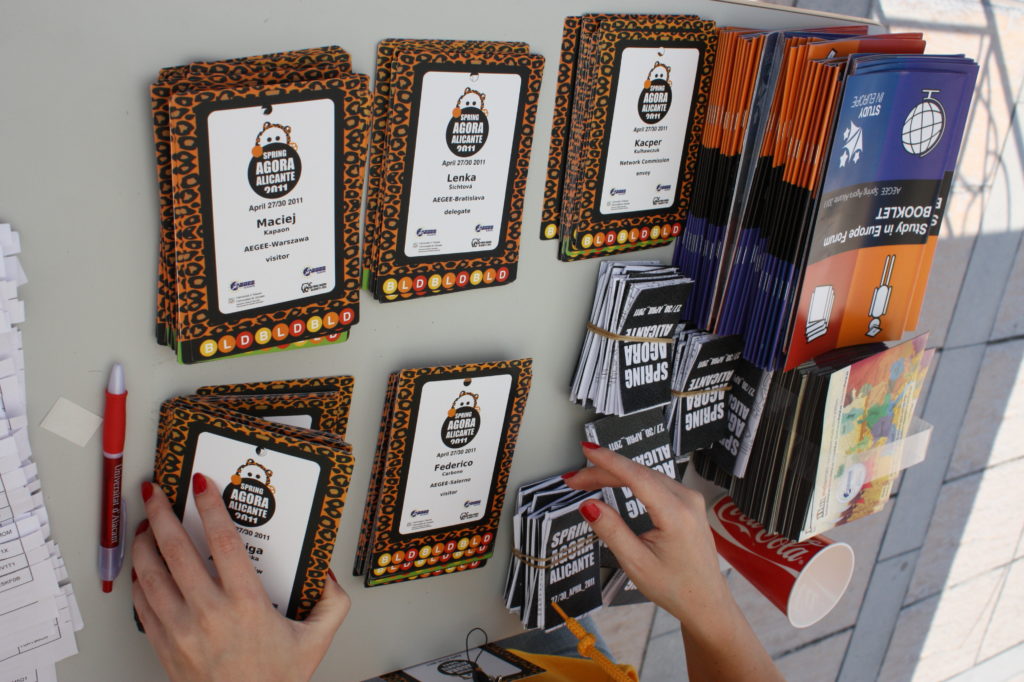
The observers became visitors
In spring 1999, at Agora Barcelona, the name observer was given exclusively to the representatives of contacts, so the other observers became visitors – and kept that name until today. Everything else stayed the same, as written in CIA 10:
(4) Contacts of AEGEE have the right to send two representatives (observers) to the Agora. Observers have neither speaking nor voting right.
(5) 1Any member of an AEGEE local has the right to act as a visitor to the Agora. 2Other visitors may only attend with the permission of the Agora Chairman. 3Visitors have neither speaking nor voting right.
(6) The number of visitors per local depends on the capacity of the organising AEGEE local.
Years later this article in the Agora Working Format was expanded into this: “Any member of an AEGEE local, a Working Group and a Project Team has the right to act as a visitor to the Agora.” Moreover, also the following was added: “Visitors who are also candidates for a position as announced by the Secretary General in accordance with article 3(4), have the right to present their candidature and answer questions about it.” You might think this is common sense that a candidate can present himself or herself, but at that time AEGEE started to regulate every possible situation in the CIA.
On a side note: until CIA 22, issued in 2011, the legal framework of AEGEE quoted an important extract of CIA 7 from 1996: “This is certainly not the last edition of the CIA. Our rules should always fulfil the conditions of stability and flexibility at the same time: We must leave them unchanged as long as possible and only modify them if it is really necessary.” In 2012, in CIA 23, this text was removed. Around 2010 AEGEE became very fond of changing the statutes and created a big number of proposals for every Agora – at Agora Leiden in 2010 it was 15. In Agora Kraków we will see 16 proposals. At Agora Torino in 2004 there were only three proposals – and you cannot say that AEGEE was not working well. The network was a lot bigger and the number of projects and thematic events much higher than today.
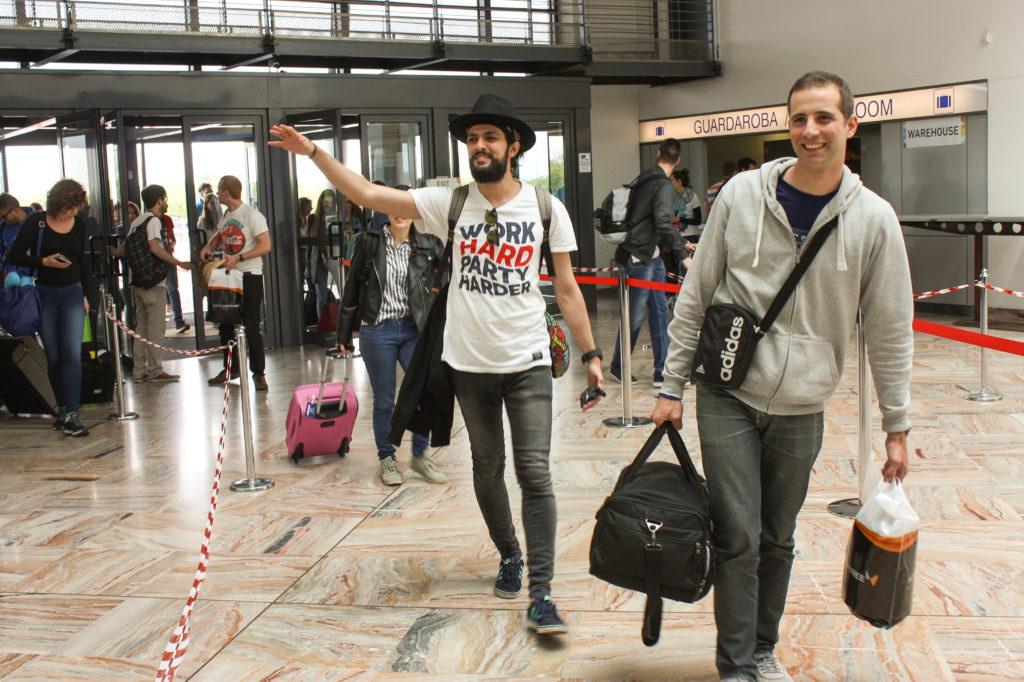
Who selects the visitors?
Back to the topic: starting in the late 1990s, applications had to be made via a specific website. Until spring 2000 it was a website of the hosting antenna, so they were still in charge of the participants selection. In autumn 2000 this website was for the first time on the AEGEE-Europe server in Karlsruhe. Each member could now apply individually. This application could be edited manually until the deadline – and since the members did not have Intranet accounts yet, they could edit their application with the help of the serial number of their membership card – just in case you ever wondered what the membership cards ever were good for.
This is what the CD wrote to the network in a mail for spring Agora Constanta in 2001:
“Local boards have to authorize their members’ applications. This is done on the same webpages (section 3). You need your body’s export password which was sent to you with the PM mailing (if you lost it write a mail to headoffice@aegee.org). IMPORTANT: Applications are not valid until the board
authorizes them, i.e. assigns a status to the person like delegate, envoy, visitor. The local boards and the European bodies received a password.
The board of each local is financially liable for all applications that are submitted and not revoked until 20th April. Even if the person does not show up at the AGORA the participation fee has to be paid by the local!”
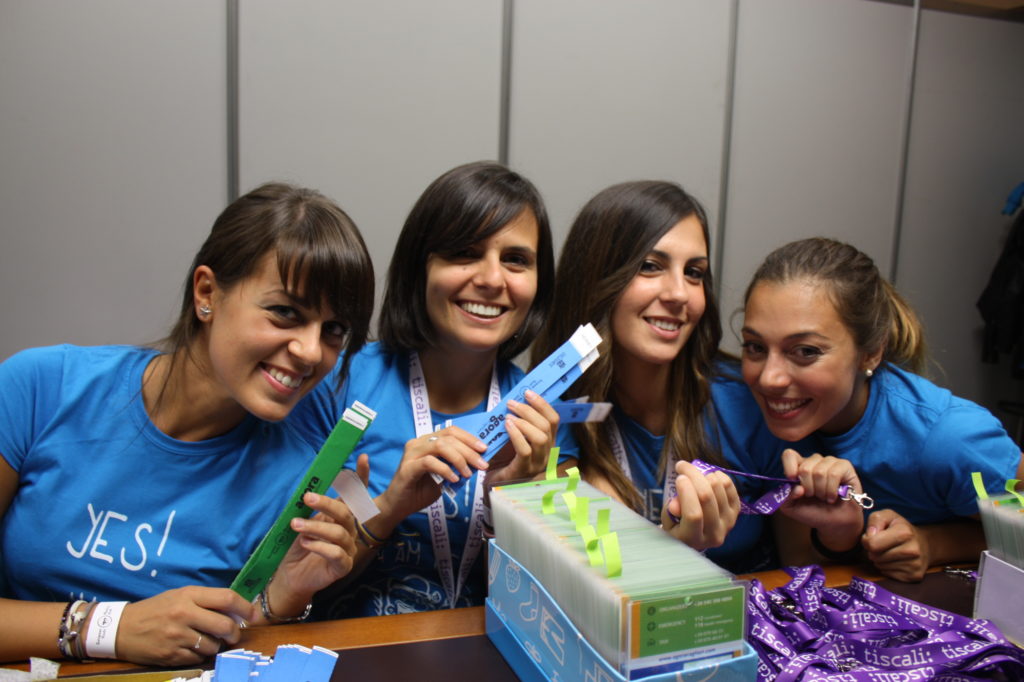
The task moves to AEGEE-Europe
Since the applications were now in an online system, AEGEE-Europe wanted to determine the visitors. The locals could determine a ranking. Enrico Lai, Vice-chair between 2000 and 2002, said that his Chair team wanted to select the visitors themselves. But that was not valid for all following Chairs. At autumn Agora Athina AEGEE-Europe used a “first come, first serve” approach. The Agora participants were informed about the procedure in an email – check especially the last sentence:
“Every board has a right to apply following members to Agora:
- Antennae: 3 delegates + 2 visitors (3 visitors for antennae with more than 120 members)
- Contact Antennae: 2 envoys
- Contacts: 2 observers
- AEGEE Working Group: 3 delegates
- Thematic and supporting WG: 2 envoys
- Project teams: 2 envoys
Visitors are accepted in the order of the appearance in the application.”
This was however an exception. From now on the Chair was in charge of the selection. Motivation letters first appeared in the application form in 2003. And: the participants received now an application ID and a confirmation mail with the text of the application. Unlike today, there was no question asked for the motivation. This was my motivation from the application for autumn Agora Zaragoza in 2003:
“Motivation and remarks: I want to come in order to defend my record in most Agora participations in the network. Currently it’s 17. I want to reach the number of 20 Agoras before quitting AEGEE. :-) I also heard the CD lacks candidates. I might help finding some last-minute candidates. :-) Moreover, I want to have a great time at the Agora!”
The currently used application form with the questions about experience, motivation and the way of contribution was introduced in spring 2004. In 2006 the application page went to its current site in Enschede, where you can still look up all kind of interesting data regarding old Agoras under http://www.zeus.aegee.org/statutory/.
The Agora Budapest scandal
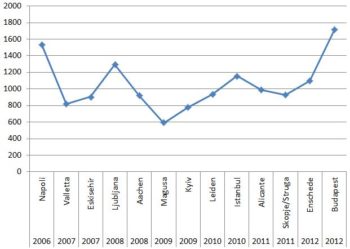
At spring Agora Alicante in 2011 for the first time it was regulated in the statutes who should select the visitors, as it was described in CIA 22: “The selection of the visitors shall be made by the Comité Directeur in co-operation with the Chairperson” is written in the section “Rules of Statutory Meetings”.
That’s a paradigm shift, because it grants the CD the rights to select visitors. Why is this significant? The CD is an actor in the Agora, but not the host. The Chair is presiding over it, therefore it was common that the Chair as neutral and impartial body should assign the visitors places. Granting the CD the right to pick the people they like and refusing maybe critical people could sooner or later cause problems.
And that is what happened soon after. The autumn Agora Budapest in 2012 became famous for being the Agora with the highest number of applications ever: 1719 applications for just 700 places. Since 500 places were needed for delegates and other essential people, only 200 visitors could come. 800 had to be rejected. This caused a lot of frustration, since many members did not consider the selection of visitors as fair and balanced.
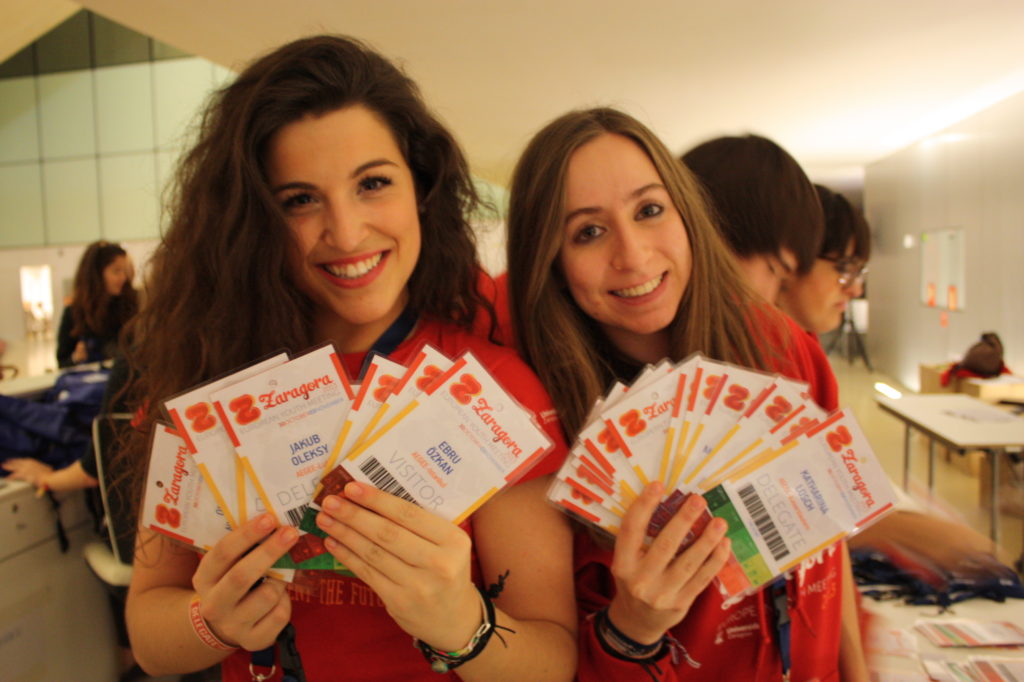
The Agora Zaragoza scandal
Just one year later the situation escalated with the much disputed selection process for autumn Agora 2013 in Zaragoza. Several members complained that they were not accepted, despite the fact that they were ranked high by their local antenna. The Chair argued that Chair and CD did not choose people who did not write a motivation letter, despite being clearly stated in the open call that people should provide one.
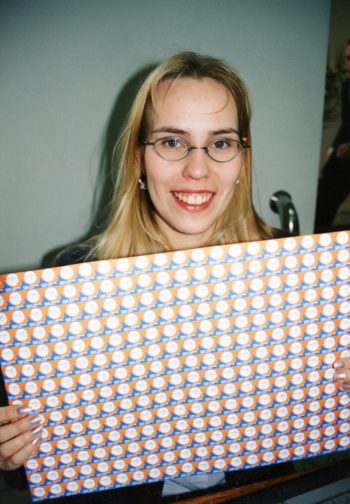
This was true, nevertheless this did not convince many of the applicants. They stated that in the previous years the motivation letter was not important, since it only served the local boards to make a ranking for the internal selection on which the CD finally based the distribution of places. And indeed, this was true. Previous Chairs did not read the motivation letter and relied on the ranking by the locals. Even some rumours passed around that there had been a hidden agenda to get rid of some people who were critical towards the CD.
These are some of the critical mails that were unhappy with the fact that an old procedure was changed without any proper announcement:
- “I must say that it is true that it was written in the Open Call that they were going to read the ML, but… is that enough when we antennae have been choosing the order for years?”, asked Álvaro Espinosa Buenaga, Vice President of AEGEE-Santander and Subcommissioner.
- “If the antennae want to choose the order, it’s because they know how active are their members and who is the best person to take part in the Agora as delegate/visitor. Each antenna should be able to decide who attends to the Agora on behalf of it. If not, the importance of the locals is nothing. One problem of the ML is that words are words, not facts. And locals are the best filter to review those facts. All the locals are different as well, so the Chair cannot decide in the best way for them”, agreed Iker Iraizoz from AEGEE-Bilbao.
- “I do agree also with what Iker and Álvaro, as it is a valid point that in some cases the board will know maybe better who is able to represent them than the blabla someone writes in the ML in order to be accepted. Yet, I am happy that we did not write a motivation for no reason, but maybe next time it could be clearer stated that this is the way to get accepted, so people might do a better job and take more time for it. I am not against this way of picking participants, but I do agree that it could’ve been clearer”, added Maria Arends from AEGEE-Groningen.
- “I really doubt it that this Chair Team had the time to read thoroughly 1252 applications and evaluate the ML in just few days. So in the end the selection of participants might not have be made with the best criteria. The task of checking the applications and ML should be done by the locals that know their members and know who can represent them in the Agora. And then Chair Team can just check for potentially “bad” ML and reject these applications”, suggested Costas Deltouzos from AEGEE-Patras.
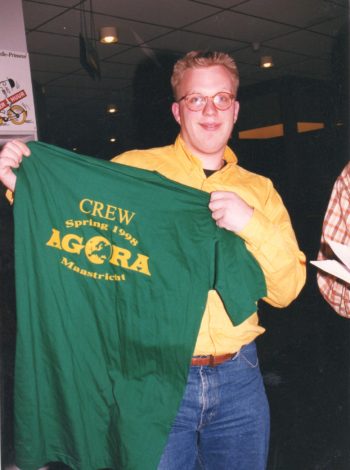
The Chair Team defended their point of view, stressing that people should have read the open call better:
“We have used following selection procedure:
- Every local had by default 3 visitors places, which means that every single local has 3 accepted visitors.
- If local had more than 3 visitors – we have read all applications from visitors from this local and have selected 3 best ones.
- Afterwards remaining places were distributed between visitors with best motivations from all locals.
We haven’t accepted visitors with an empty motivation. All others were rated by 6 different people from Chair & CD and we selected the best according to it. It is unfortunate that the explanation provided by us on the selection procedure in the Open Call hasn’t reached every applicant. We will make sure to include emphasising the selection procedure in the Knowledge Transfer with the next Chair Team.”
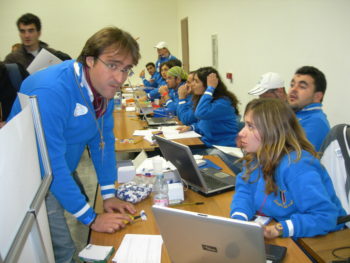
This didn’t satisfy the Agora. Mattia Abis (AEGEE-Cagliari), Claudio Armandi (AEGEE-Napoli), Erika Bettin (AEGEE-Venezia), Alberto de Nardi (AEGEE-Udine), Luca Lombardo (AEGEE-Torino) and Antonio Morelli (AEGEE-Catania) made an Agora proposal in Zaragoza that resulted in this change that should create a better selection:
“(4) The selection of the visitors shall be made by the Comité Directeur in co-operation with the Chairperson taking into account the ranking and comment provided by the board of the respective AEGEE local.”
The situation today
Since then the statutes have not been changed, the selection procedure has not changed much. Only one important matter is different today. In order to make sure that AEGEE-Europe is fair in the selection, the Chair doesn’t see the name of the applicant, only local, participant type, motivation letter and board comment.
Recently only the Chair made the selection – as it should be to make an unbiased choice. Also today it is required to write a motivation letter. Without it, every visitors’ application is rejected – and this rule applies for everyone. Erika Bettin, Chair in 2017: “Our Chair Team rejected some excellent members for this reason!”
